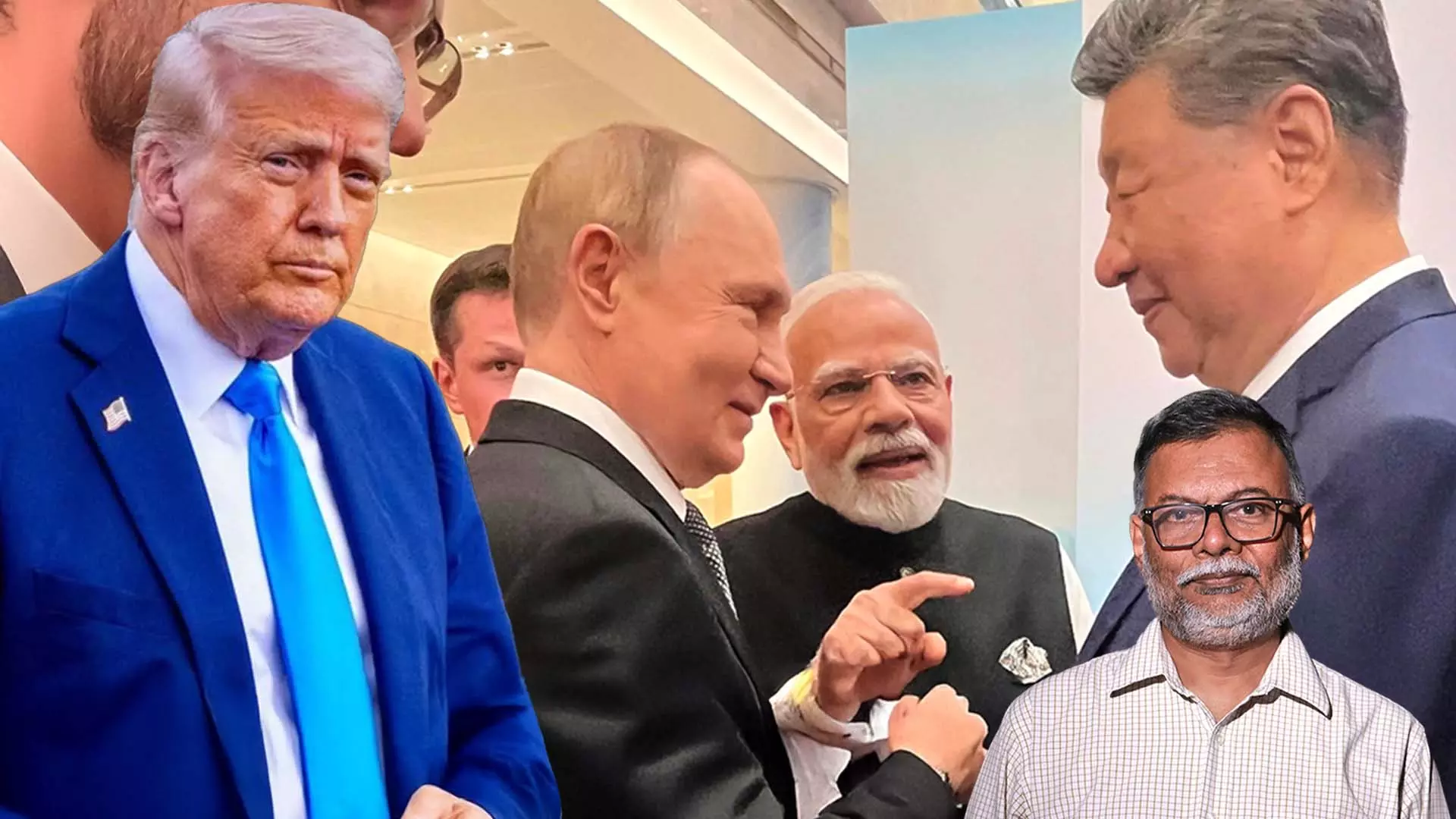
With Donald Trump’s punitive tariffs jolting international trade relations, the SCO has emerged as an unexpected stage for strategic recalibrations.
Trump’s tariffs push India to reconsider global strategy
KS Dakshina Murthy explains why the Shanghai Cooperation Organisation (SCO) has gained fresh relevance for India amid US trade tensions

The Shanghai Cooperation Organisation (SCO) summit concluded recently at a critical time for India and global geopolitics. With Donald Trump’s punitive tariffs jolting international trade relations, the SCO has emerged as an unexpected stage for strategic recalibrations. In this conversation, KS Dakshina Murthy, The Federal's consulting editor, unpacks what the summit means for India, the US, and the future of multilateralism.
How will the SCO summit impact global equations? Will it change how countries deal with each other?
The SCO has always been an important organisation, but it has gained new relevance because of Donald Trump. His punitive tariffs - 25 per cent, and effectively 50 per cent when you include the reciprocal tariffs - have thrown India’s foreign policy into an unexpected corner. To navigate this, the SCO has suddenly become crucial for India.
Earlier, India didn’t see the SCO as central because of Pakistan’s presence and its uneasy ties with China. But Trump’s tariffs have not only shocked India but also bewildered countries worldwide. That makes the SCO significant at this juncture.
Also Read: Putin briefed Modi on Alaska talks with Trump during SCO summit
For India, it has meant a swift recalibration, especially towards China. The thaw in ties over the past year and Prime Minister Narendra Modi’s presence in China underscored India’s recognition of the SCO’s importance. Beyond India, the summit created a sense of camaraderie among leaders - Putin, Modi, and Xi Jinping seen together, laughing and sharing lighter moments. The optics rattled Washington, with voices in the US administration criticising Modi’s presence alongside authoritarian leaders. So while the summit did not deliver major decisions, it sent a powerful message that countries could respond to Trump collectively.
Should India leverage the SCO to counter US tariffs?
For years, India had become complacent in its relationship with the US. As strategic partners, India assumed it would be treated like Washington’s European allies. The trade deficit, where India exports more to the US than it imports, was never seen as problematic. Trump disrupted that comfort zone.
Also Read: Decoding strategic realities behind Modi-Xi's diplomatic tango
This has forced India to accept that no relationship can be taken for granted. It must diversify its trade and foreign policy. That means exploring opportunities with Japan, Southeast Asia, Latin America, and others, rather than over-relying on the US. Trump’s tariffs have fundamentally pushed India towards greater independence in global trade.
Since each country has its own relationship with the US., will that limit the SCO’s effectiveness?
The SCO’s optics worked well, signalling that countries could align despite differences. But the organisation has inherent limitations. Russia, for example, is entangled with the US over Ukraine. China, meanwhile, is both America’s biggest rival and deeply interdependent with it.
Also Read: Trump aide calls SCO meet ‘largely performative’, says US-India can iron out differences
So India cannot rely solely on the SCO. If Russia’s position shifts due to the Ukraine conflict, or if China recalibrates, the SCO’s effectiveness could be compromised. That’s why India must be pragmatic, balancing ties with SCO members without placing all its bets there.
Why are India-US relations under such stress, and how might they evolve?
During the Cold War, India leaned toward the Soviet Union, which strained ties with the US. But post-Cold War, relations opened dramatically. This current crisis is the first real stress test since then.
Trump’s tariffs don’t touch everything. IT services and pharmaceuticals are unaffected, but sectors like garments - vital for India’s employment - have been hit hard. That creates economic as well as political pressure.
Also Read: Rubio hails US-India ties amid SCO summit bonhomie, Trump tariff row
Ultimately, the friction stems from Trump’s style: it’s his way or no way. India is caught directly in his path, and he is trying to bulldoze it into concessions. While the outcome depends partly on the Ukraine war, larger issues like US demands to open Indian agriculture remain unresolved. So, tensions will persist, and India must devise strategies to withstand them.
Has Trump’s rigid stance revived multilateralism globally?
Yes. Trump’s harsh and uncompromising approach has forced countries to rethink. Brazil faces similar tariffs as India. Many others have been targeted. As a result, multilateralism - long in decline since the US became the lone superpower - has returned to relevance.
Organisations like the SCO and BRICS have gained traction. The SCO focuses on Eurasian security, while BRICS addresses financial and economic issues of the Global South. Both reflect the renewed push for collective action.
Also Read: India-China at SCO: Retd Commodore Seshadri Vasan explains Modi’s balancing act
Countries now recognise they cannot face the US alone. Even major powers like France are under pressure. Trump, ironically, has revived multilateralism, making it the “flavour of the day". The challenge now is to sustain it beyond Trump’s tenure. Multilateralism should not collapse once the immediate threat passes. It must become a permanent feature of global politics, enabling countries to stay independent of superpower dominance.
(The content above has been transcribed from video using a fine-tuned AI model. To ensure accuracy, quality, and editorial integrity, we employ a Human-In-The-Loop (HITL) process. While AI assists in creating the initial draft, our experienced editorial team carefully reviews, edits, and refines the content before publication. At The Federal, we combine the efficiency of AI with the expertise of human editors to deliver reliable and insightful journalism.)

